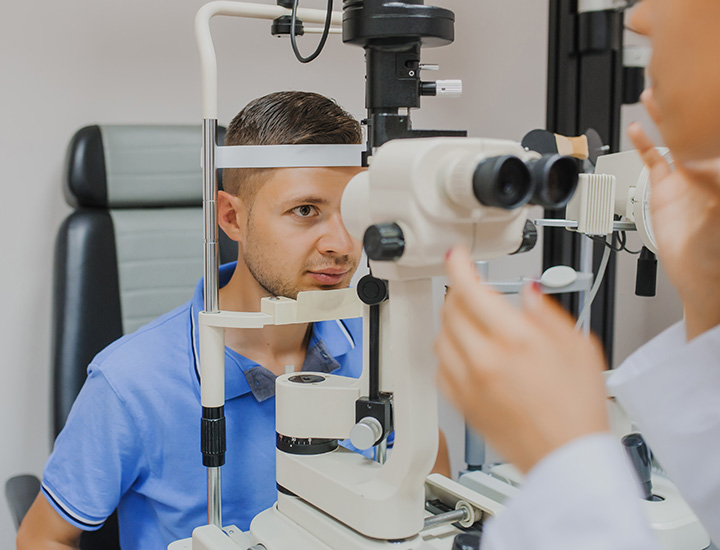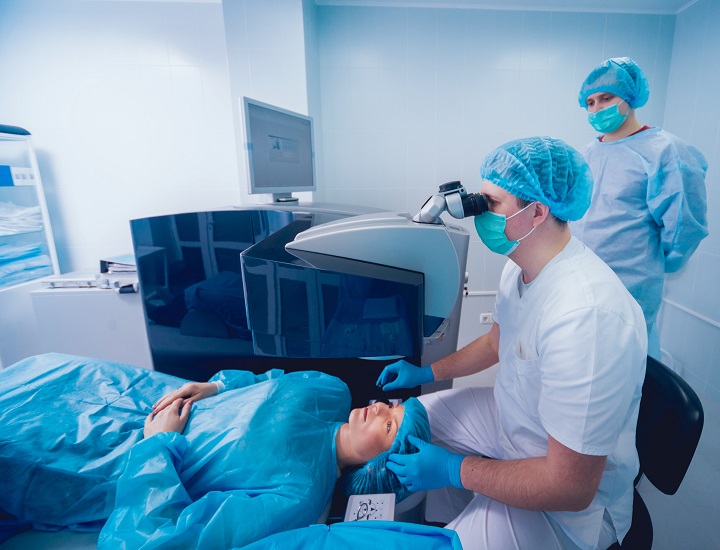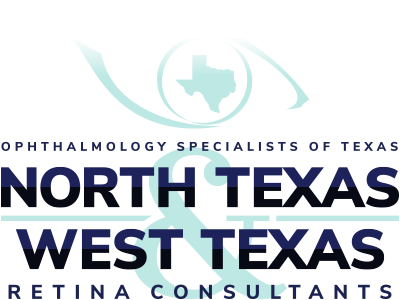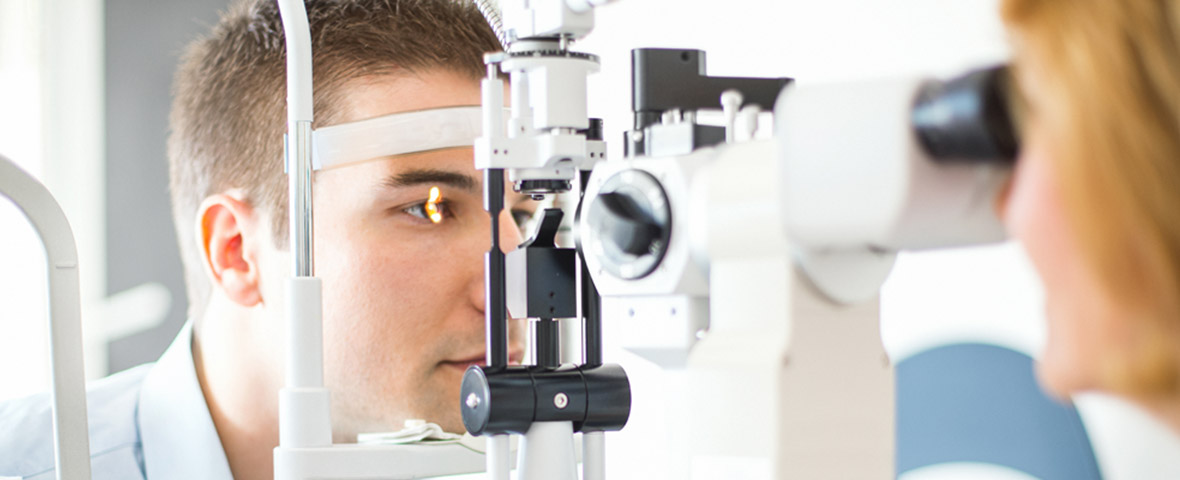
Laser Treatment Options
The Word Laser Stands For “Light Amplification By Stimulated Emission Of Radiation.” A Laser Is A Concentrated Beam Of Light, Created When An Electric Current Passes Through A Special Material.
Schedule Your AppointmentThe Name And The Color Of The Laser Depend On The Type Of Special Material That Is Used:
- YAG (yttrium-aluminum-garnet)—invisible infrared light;
- argon–fluoride (excimer)—invisible ultraviolet light.
Laser Surgery In Ophthalmology Can Successfully Treat Many Types Of Eye Diseases.

How does the laser work?
There are two different ways that lasers are used to treat eye diseases.
The heat is used to:
- seal blood vessels (veins and arteries) that are bleeding or leaking fluids;
- destroy abnormal tissue such as a tumor;
- bond the retina to the back of the eye;
- open the eye’s filtration system for glaucoma treatment;
- create an opening in the iris for treatment of narrow-angle glaucoma.
Photodisruptive lasers (YAG and excimer): The light cuts or sculpts the tissue, similar to a knife.
The beam of light is used to:
- cut thin membranes inside the eye that are blocking vision;
- change the shape of the eye’s surface.
What are the advantages of using ophthalmic lasers?
Laser surgery of the eye has several advantages:
- there is no risk of infection from the laser light;
- laser surgery can be performed in an outpatient setting, allowing you to go home shortly after the procedure is finished;
- the surgeon has great precision and control.
Which eye diseases can be treated with laser surgery?
Diseases of the retina
Retinal tears or holes: The retina is the inner layer of the eye that senses light and helps you to see. If the retina tears, it can separate from the back wall of the eye. This is called a detached retina, and it can cause you to lose sight. Symptoms of retinal tears include:
- sudden flashes of light;
- “floaters” or specks in your vision.
Most retinal tears can be treated with the argon or krypton laser, if they are found before the retina detaches. The laser helps bond the retina to the wall of the eye, preventing a retinal detachment.
If retinal detachment has already occurred, the laser may be used as part of a surgical repair of the detachment.
Diabetic retinopathy: Eye disease from diabetes is a major cause of vision loss. Diabetes can cause blood vessels in the retina to grow abnormally. The vessels can leak fluid (macular edema) or bleed inside the eye.
Laser surgery to treat diabetic retinopathy
- seals leaking blood vessels to reduce macular edema, helping to prevent further vision loss;
- slows or stops growth of abnormal blood vessels, decreasing the chance of bleeding in the eye.
Macular degeneration: The macula is the small, central area of the retina that allows us to see fine details clearly. Macular degeneration affects your central or reading vision.
Most people have “dry” macular degeneration, which cannot be helped by laser surgery.
A few people have “wet” macular degeneration. With this condition, abnormal blood vessels cause bleeding and scarring of the macula. In certain cases, these people may be treated with the argon or krypton laser. The laser seals the blood vessels to prevent further damage.
There are other retina problems that can be treated with the laser, including:
- retinal vein occlusions;
- histoplasmosis;
- central serous retinopathy;
- some tumors of the eye.
After cataract surgery: After a cataract has been removed, the capsule of the lens sometimes becomes cloudy. The neodymium-YAG laser can open up this cloudy membrane and restore clear vision.
Glaucoma: Glaucoma is a disease of the optic nerve. This nerve sends images from the eye to our brain and allows us to see. Glaucoma is the second most common cause of blindness in the United States, and the leading cause of legal blindness among African Americans.
Glaucoma damages the optic nerve, usually because the fluid pressure inside the eye is too high. Loss of vision from glaucoma can often be prevented if your ophthalmologist discovers the disease before much damage occurs to the optic nerve.
Glaucoma must be detected early if treatment is to be successful.
Eyedrops or pills are the usual way to treat glaucoma. If they do not control the pressure within the eye, laser surgery may be used to lower the pressure.
Refractive surgery: In procedures such as photorefractive keratectomy (PRK), and laser in situ keratomileusis (LASIK), the excimer laser is used to sculpt the cornea and reduce or eliminate the need for eyeglasses or contact lenses.
Summary
Laser surgery has been one of the great advances in treating eye diseases. The success of the laser depends on the type of eye disorder.
In most situations, laser surgery helps prevent further loss of sight, but will not provide great improvement in vision. In a few situations, such as YAG laser surgery, PRK or LASIK, vision may be improved considerably.
Your ophthalmologist (Eye M.D.) will discuss the risks and benefits that laser treatment can offer you.
Source: http://www.eyecareamerica.org/eyecare/tmp/laser-surgery-of-the-eye.cfm
This procedure uses a high energy laser beam to treat the peripheral retina. It causes the abnormal blood vessels to shrink and frequently prevents their future growth. It also reduces the risk of vitreous bleeding and retinal detachment that might develop over time. Multiple laser treatments sessions might be necessary. Laser treatment does not cure diabetic retinopathy and does not always prevent further visual loss.
Some slight discomfort can occur with this surgery. Most people are able to tolerate this surgery without difficulties. It takes approximately 30 minutes and can be performed at the office.
Treatments
Your doctor has recommended focal laser treatment to your retina to treat swelling of the center part of your retina, also called MACULAR EDEMA. This condition arises from damage to blood vessels inside of your eye due to diseases like diabetes and blocked blood vessels also known as vein occlusion.
Treatment is helpful at reducing the risk of further loss of vision. Typically, treatment does not result in vision improvement. You doctor at has advised focal laser treatment because without such treatment, you stand a greater chance of losing more vision over time.
Treatment is administered in the office with the use of a topical anesthetic eye drop to keep your eye comfortable. You will have a special contact lens placed onto the eye and a bright light will be shown in the eye. You will experience bright flashes of light during treatment but typically there is NO PAIN.
The treatment takes a few minutes. Afterwards your vision will be dark. Do not be concerned as this is short lived. For several minutes after treatment, everything may look red or pink to you. Vision may remain somewhat blurry for the remainder of the day following treatment and, rarely, for several days thereafter.
Side Effects
Although treatment is highly effective at reducing further loss of vision due to your retinal disease and is very safe, there are some side effects and rare complications that you must be made aware of.
The most common side effect of treatment is the appearance of spots in the vision, typically just off to the side of your central vision. Although in most cases these spots will go away, they can rarely persist indefinitely.
Very rarely, loss of vision can occur as a complication of laser treatment.
Most retina specialists have never experienced this complication in any of their patients but it has been reported. Overall, it is among the safest types of laser eye treatment one can have.
Focal laser treatment is not a cure for your condition. It simply helps to stabilize or control complications of your disease that have caused vision loss or threaten to cause vision loss. Your disease may still progress and the need for additional laser treatment over your lifetime is very common.
The effects of laser treatment may take several months to become evident. Your doctor will arrange for follow-up evaluations to monitor your response to laser treatment.
Controlling your diabetes, high blood pressure, and cholesterol are the most important factors in maintaining the health of your eyes.
Your Eye MD is dedicated to keeping your eyes as healthy as possible and is committed to being available to answer all of your questions or concerns about your disease and treatment. Please call our office if you have any concerns about your condition or the treatment that has been advised.
If a retinal tear or detachment occurs, there are several options for treatment. Laser is used to make small burns around the retinal tear or the small detachment area. The natural recovery from the laser burns results in sealing the retina to the eye wall. This prevents the tear or the small detachment to evolve into a complete retinal detachment and loss of vision can be avoided. This procedure can be performed in the office.



